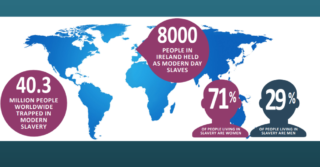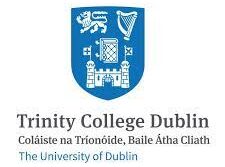What is Modern Slavery? As a business, why should I be concerned?
When people hear the word ‘Slavery’ they associate it with terrible practices that happened a long time ago in locations far away.
Thinking a bit more, they might associate it with terrible practices that continue to happen, but in locations far away.
Most people don’t realise that modern slavery is something that is happening right now, right here in Ireland, in urban and rural locations where people are being forced to work inhuman hours for low, if any pay, deprived of sleep, often hungry and living in cramped, unsavoury accommodation.
This might be a difficult fact to digest but it’s true.
‘Modern Slavery’ is the term used to describe slavery, labour exploitation, forced labour and human trafficking. ‘Human Trafficking’ is the recruitment, transfer or obtaining an individual through fraud, abduction or force. Human Trafficking is the fastest growing form of international crime and the third largest criminal industry after drugs and arms trafficking.
The 2018 Global Slavery Index estimates over 40.3 million people worldwide are enslaved in some way – 71% are women. Within these figures, 8000 people are estimated to be held as Modern-Day Slaves in Ireland (and 136,000 in the UK) but it’s very likely these figures are higher because cases are difficult to detect. Earlier this month, the International Labour Organisation[1] (ILO) estimates 50 million people, or one in every 150 people alive, are trapped in forced labour or forced marriage – an increase of nearly 10 million in five years.
It might surprise you that research is showing no single business in any part of the world can say their operations and supply chain are free of risk of modern slavery or human rights infringements. Human rights infringements include excessive working hours; the under-payment or non-payment of wages; the non-payment of overtime; and poor health and safety.
In Ireland, high-risk sectors for modern slavery include Agriculture, Food Processing and Construction. These sectors are high-risk because they rely heavily on temporary labour at peak times of the year and it is migrant workers, seasonal workers and refugees who are most vulnerable to exploitation.
Other high-risk sectors are Apparel (for the sourcing of Uniforms worn by your security staff or T-Shirts worn by staff for volunteer days) and Facilities Management, on account of their use of Recruitment Agencies by Sub-Contractors in the areas of Catering, Cleaning, Security & Maintenance. Modern Slavery is particularly common in Ireland in the sourcing and packing of fresh produce, fruit and vegetables, meat and fish.
Documented cases in Ireland of private sector modern slavery include that of migrant workers in 2006 employed picking mushrooms were found to be paid well below the minimum wage, forced to work up to 16 hours per day with no overtime, seven days every week. In March 2022, the Workplace Relations Commission ordered the owner of a Tipperary mushroom farm to pay a female Romanian Mushroom Picker €15,000 in compensation for failing to pay her the minimum wage for an 80-hour week. This woman was working 15-hour days but getting paid for less than half of them.
The rise of Debt Bondage
A major cause of modern slavery, forced labour and exploitation found in Irish company operations and supply chains (and it might be at Tiers 3 or 4 of your supply chain) is the charging of recruitment fees to migrant workers, seasonal workers and workers recruited through labour providers.
Unscrupulous recruiters and human trafficking networks pose as legitimate temporary work agencies and they sell the promise of a job, a visa and a better life. Desperate migrants take out a loan to pay these work agencies, to pay recruitment fees, accommodation expenses and travel costs.
Once the migrants arrive in Ireland, the recruiters get them to set-up a bank account, but the recruiter retains the migrant’s bank card, their passport and the vast majority of their wages, paying them only a miniscule amount each week to live on as pay-back for the job, daily travel expenses and usually extremely unsavoury accommodation.
In most cases, the migrants recruited don’t speak English, they don’t know their rights, they often don’t know they have employment rights because they are repeatedly fed mis-information, threatened with violence and told by their recruiter that if they don’t comply with the situation, they’ll be deported to their home country.
This practice is known as Debt Bondage. It is a frightening example of hidden labour exploitation and it is getting increasingly more common.
How You Do Business Matters
You do not want the food served in your on-site canteen, or the people preparing it, to be in any way connected to a situation involving debt bondage, forced labour or modern slavery.
The same is true for the people providing security and maintenance for your firm, cleaning your floors, constructing your new building or making the uniforms and other apparel used by the business.
It behoves companies everywhere to examine their existing values and commitments and to put in place the practices and people-centred risk-based investigations necessary to ensure these commitments are being upheld, both in their operations and their chains of supply.
Another reason to be concerned about modern slavery is the proposed EU Corporate Sustainability Due Diligence Directive – the CSDDD (or ‘CS Triple D’). Announced on February 23, 2022, this proposed EU Directive is seeking to improve corporate governance around the mitigation of risk, for both human rights and the environment.
From 2025, the Directive will apply to companies with over 500 staff and a turnover of €150 million or more. From 2027, it will also apply to companies with over 250 staff and a turnover of €40 million or more, if they operate in defined high impact sectors, e.g. agriculture, textiles, extraction or minerals. The Directive will also apply to non-EU headquartered companies who are active in the EU, and who meet the above criteria if their turnover is generated in the EU.
If you are a supplier or a business partner of a company within scope, this proposed Directive is relevant for you too on account of the quality of due diligence that will be required.
Are the CSDDD and the proposed Corporate Sustainability Reporting Directive (the CSRD) connected?
For both the CSDDD and the CSRD, applicable companies will be required to integrate social and environmental sustainability into their corporate governance and management systems. Business decisions will have to be framed in terms of their impact on human rights, climate and environment, as well as the company’s longer-term resilience.
For both the CSRD and the CSDDD, companies will have to publicly communicate their human rights and environmental due diligence (or risk management) practices.
By requiring companies to identify their adverse human rights and environmental impact risks in all their operations and their value chains, the CSDDD is seeking to ensure that investors have the requisite information to allocate capital to companies who are socially, environmentally and financially sustainable.
How will the CSDDD be enforceable by EU member states?
Significant about the CSDDD is that upon ratification of the legislation, member states will be required to designate an authority to ensure effective enforcement and adapt their own rules on civil liability to cover cases where damage results from ‘the failure of a company to comply with due diligence obligations’ and ensure victims have access to justice and compensation.
On a practical level, what is the EU expecting from business on Human Rights?
Companies for whom the Directive will apply will require a:
- Human Rights & Modern Slavery Mitigation Policy (separate to a Supplier Code of Conduct).
- Clear Process for Conducting Human Rights Due Diligence (see the note below).
- Governance Structure with clear lines of ownership & responsibility e.g. a board member identified; a day to day lead, budget assigned, cross functional involvement, champions in all areas.
- Strategy with human rights objectives that are measured, tracked & reported.
- Programme of Training for leadership teams, relevant staff, suppliers and contractors.
What is meant by ‘Conducting Human Rights Due Diligence’?
Conducting ‘Human Rights Due Diligence’ is about identifying and managing key risks as they pertain to the infringement of human rights and the mitigation of modern slavery. It means taking the steps necessary to ensure the company is not involved in human rights infringements, either through its direct actions, or indirectly, through the actions of suppliers, sub-contractors, recruitment agencies, business relationships, subsidiaries and investments.
Key steps in Conducting Human Rights Due Diligence include:
- Mapping the business operations & supply chain.
- Assessing the level of risk in each relationship and prioritising according to the risk to people and the reputation of the brand.
- Engaging the companies worked with on the issue of modern slavery to find out what actions they are taking to ensure modern slavery has not infiltrated their chain of supply.
- Travelling to sites of operation to ask questions of the people working there about their hours of work, pay & conditions, health & safety.
- Taking action to ensure identified infringements do not re-occur and ensuring access to remedy for those that have.
Next Steps
An update from the EU on the proposed CSDDD is expected in Q4 2022. Our advice to you and your company: Do not wait for legislation! It’s vital your company acts now to ensure it’s not complicit in modern slavery.
Key Resources
- BITCI Guide on How to Mitigate the Risk of Modern Slavery
- CSR Europe Synopsis of Proposed CSDDD
- Press Release CSDDD & CSDDD Full Text
- UN Guiding Principles on Business & Human Rights
- UN Guiding Principles Reporting Framework.
- OECD Guidelines for Multinational Enterprises.
Further Information
Further information on the proposed Corporate Sustainability Due Diligence Directive and how to start preparing for it from a human rights perspective is available from Darina Eades, Senior Advisor on Corporate Sustainability, BITCI. Email: deades@bitc.ie
Further information on the proposed Corporate Sustainability Due Diligence Directive and how to start preparing for it from an environmental perspective is available from Aoife Gillen, BITCI Low Carbon Pledge Lead and Sustainability Advisor. Email: agillen@bitc.ie
[1] Modern Slavery shoots up by 10 Million in five years (September 12, 2022).
[2] https://www.irishtimes.com/business/agribusiness-and-food/mushroom-farm-must-pay-worker-15-000-over-minimum-wage-breach-1.4823530
[3] BITCI article on the Corporate Sustainability Reporting Directive
References






